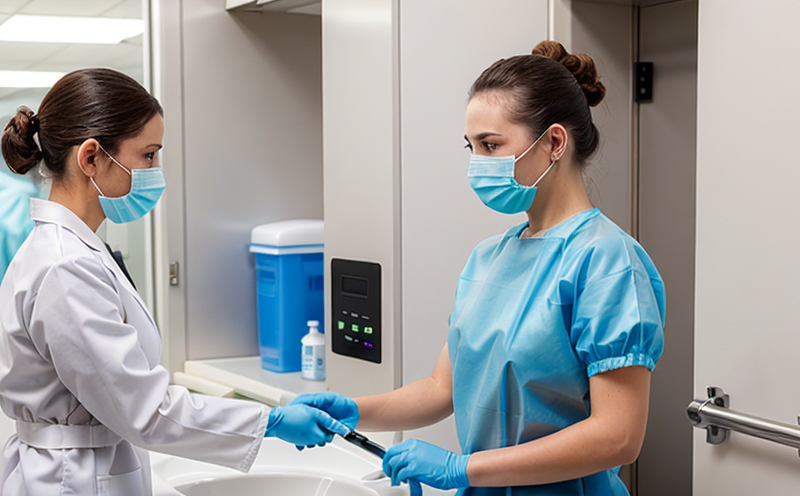JIS L1912 Testing methods for antifungal activity of fabrics
The Japan Industrial Standard (JIS) L1912 specifies a method for determining the antifungal activity of fabrics. This test is crucial for ensuring that textiles can effectively inhibit fungal growth, which is especially important in industries such as healthcare, sports, and leisurewear where hygiene concerns are paramount.
The JIS L1912 testing protocol involves exposing the fabric samples to a standardized fungal inoculum under controlled conditions. The test aims to measure the inhibition zone around the fabric sample, indicating its effectiveness against fungi. This method is based on ISO standards but has been adapted and optimized for Japanese market conditions.
The process begins with careful preparation of the fabric specimens. Samples are cut into standard sizes (typically 50x70 mm) to ensure consistency across tests. The samples are then inoculated with a suspension of fungi, usually from the genus Candida or Fusarium, depending on the specific requirements of the product being tested.
The specimens are incubated for an extended period, typically up to 14 days, in a controlled environment that mimics real-world conditions. During this time, growth is observed and measured. The effectiveness of the fabric is determined by the size of the inhibition zone around the sample. Larger zones indicate greater antifungal activity.
For accurate results, it's essential to follow strict specimen preparation and handling procedures. This includes ensuring that all equipment is sterile and using appropriate dilutions for fungal suspensions. The test also requires precise temperature control during incubation, typically between 25°C and 30°C, with relative humidity maintained at around 90%.
The JIS L1912 method has been widely adopted in Japan due to its stringent requirements and rigorous testing protocols. It is particularly relevant for industries where hygiene standards are critical, such as medical garments, athletic wear, and home textiles. Compliance with this standard can provide significant competitive advantages by ensuring product quality and safety.
- Q: What kind of fungal strains are typically used in JIS L1912 tests?
- The most common strains used include Candida albicans and Fusarium solani. These were selected based on their prevalence and severity of infections.
Eurolab Advantages
Eurolab offers a comprehensive suite of services for JIS L1912 testing, providing unparalleled expertise and precision. Our state-of-the-art laboratory facilities ensure that all tests are conducted under the most stringent conditions, ensuring reliable and consistent results.
- Q: How does Eurolab's experience benefit clients?
- Eurolab's extensive experience in textile testing allows us to offer tailored solutions that meet both local and international standards. Our team of experts ensures that every test is conducted with the highest level of accuracy.
Customer Impact and Satisfaction
Eurolab's JIS L1912 testing services have a profound impact on customer satisfaction by ensuring that products meet stringent hygiene standards. By providing reliable test results, we help our clients maintain their market reputation and ensure compliance with regulatory requirements.
- Q: What is the typical turnaround time for JIS L1912 testing?
- The average turnaround time is approximately 3-4 weeks, but this can vary depending on the complexity of the sample and the specific requirements.
Competitive Advantage and Market Impact
Eurolab's JIS L1912 testing services offer a competitive edge by ensuring that products are free from harmful fungi, thereby enhancing consumer trust and satisfaction. This can lead to increased market share and improved brand reputation.
- Q: Is there any additional certification required after passing JIS L1912 tests?
- In most cases, no further certifications are needed as the test results can be used to demonstrate compliance with this standard. However, it is advisable to check with specific regulatory bodies in your region.





